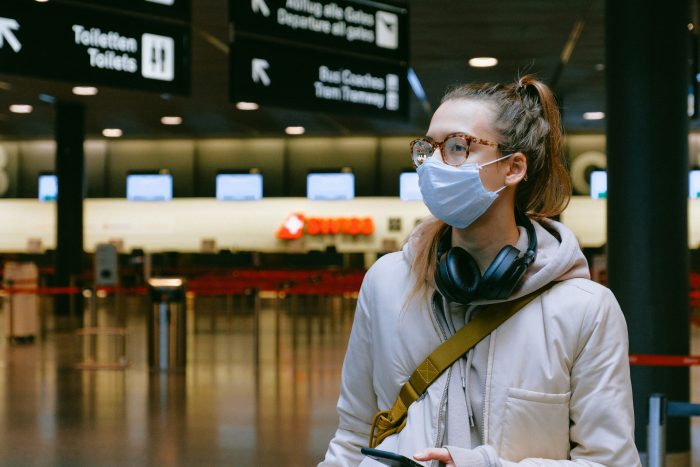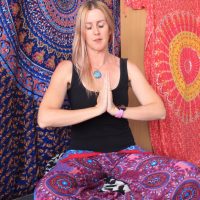If you have been feeling lonely lately in the middle of this worldwide pandemic, you are not alone.
As we head into the fifth month of lockdown here in Melbourne, Australia, we are tired.
The entire world is tired and losing stamina by the day.
As the pandemic drags on, many people are feeling flat and alone.
We are living under a global collective consciousness of fear and anxiety. And this is leading to exhaustion. To protect ourselves and others and, in particular, the most vulnerable of us, against this insidious virus, we have been told to stay home. To isolate ourselves from others.
This has led to feelings of loneliness for many. It’s been tough—so tough. And I am a lucky one. I have a partner and two teenage kids, and as an essential health service worker, I have been able to continue to do the work I love—helping others.
But I have still felt lonely and isolated. I miss long drives, markets, coffee dates, brunch with friends, Sunday afternoon beers, and my running group. I also miss catch-ups with my extended family.
But these losses I am experiencing are all first world problems really, comparatively speaking. As I said, I am fortunate to be surrounded by three people who love and care about me. We eat together, we watch TV together, we walk together. We are not alone—by the true definition of the word.
I can’t even begin to imagine what these feelings of isolation and loneliness feel like for those living alone. To not share a coffee or a beer with another person, to not hug or even touch another human being. And the worst part of all of this is we don’t know when it will end.
I have clients who have requested more regular appointments simply so they can have human contact and interaction. I am their lifeline. Their beacon in the storm. Their remedy to their loneliness
We can all relate to loneliness; everyone has felt lonely before at some point in their lives.
But there can be a stigma and shame in feeling—and admitting to—feeling lonely. But what is loneliness? Is loneliness an emotion, a feeling, or perhaps a condition? And why has it, in the midst of this pandemic, become a significant impact of a worldwide physical illness?
Dr Vivek Murphy, in his book Together: The Healing Power of Human Connection in a Sometimes Lonely World, makes a case for loneliness as a public health concern: a root cause and contributor to many of the epidemics sweeping the world today from alcohol and drug addiction to violence to depression and anxiety. Loneliness, according to Murphy, is defined in science by a discrepancy and a gap between the connections that you need and the connection that you have. Loneliness is quite simply a lack of human connection. Loneliness, he argues, is affecting not only our health but also how our children experience school, how we perform in the workplace, and the sense of division and polarization in our society.
He also states that researchers have identified three dimensions of loneliness to reflect the particular types of relationships that are missing and can lead to feelings of loneliness:
1. Intimate or emotional loneliness: family and intimate partner
2. Relational or social loneliness: friendships
3. Collective loneliness: community
During this pandemic, the latter two are the ones that many of us may be feeling the most—loss of connections with friendships and community. But for those who live alone, all three are relevant; all three would be felt acutely.
And the impact is being compounded due to social distancing restrictions and with so many activities being closed down. We now have very few opportunities to satisfy these dimensions.
These three dimensions are also really interesting as they can help us understand why, for example, someone with a loving family feels lonely. This may be due to deficits in the other two dimensions.
Loneliness is toxic to the system. When we feel lonely, this increases the production of the stress hormone cortisol. And excessive cortisol can lead to sleep issues, anxiety, and other more serious health issues.
Loneliness has been connected to all sorts of health issues and a shorter life span. Healthy social connection quite simply reduces our stress levels. When we experience human connection we produce the connection hormone oxytocin. Oxytocin is the love drug.
Humans are wired for connection: we are pack animals, and the desire to connect with other humans is instinctual. Being alone is not reflective of our true nature. In prehistoric times, we needed others to survive. This was a given. But now, not so much. To a degree, modernity encourages going it alone, being strong and independent, and the notion that we don’t need others.
From a mental health perspective, isolation, loneliness, and lack of connection with others lowers mood and decreases motivation. I am seeing this in my work with others.
Loneliness can manifest in tiredness, irritability, and anger. Loneliness can chip away at self-esteem, as it can make people feel like they are not likable. Loneliness is also a key contributor to substance misuse. Lack of quality connection to others can also lead to engaging in dysfunctional coping mechanisms such as problematic alcohol use and substance misuse. If I have no one to keep me company, may as well hug that bottle or become intimate with an illicit substance.
And of course, these mind-altering tools can numb the emotional pain and encourage the mind to forget the isolation even for a little while. Whilst people are locked in their homes, internal chatter and demons are also louder and much harder to slay as we are alone, alone with our thoughts, and for some, alone with their trauma history.
Human connection and social connectedness is one of the best defenses against mental illness. Healthy human connections also promote psychological recovery. As cliché as it sounds, love heals.
And what of touch deprivation? This is an extension of isolation and loneliness. If you are alone, you are not experiencing physical touch.
I had never heard of this term until the pandemic hit. Those who live alone and cannot physically interact with others via handshakes or hugs will be experiencing what is known as touch deprivation or skin hunger. Many of us don’t realise how much touch we receive naturally in our everyday lives until it’s gone.
In the absence of human touch, we can start to suffer and to feel disconnected from people. This too can impact mental and emotional health, resulting in depression and anxiety.
Many of us know the heartbreaking story of the babies in the Romanian orphanages who were left for days, even months on end, in their cots. They were never held, nurtured, or touched lovingly. The amygdala, the emotion centre in the brain, didn’t develop properly in these babies as they were deprived of human touch. Knowledge gained from that moment in Romanian history was groundbreaking as it taught us that we need human connection and touch not only to survive, but to thrive.
The Band-Aid for now, the salve whilst we are locked in our homes physically disconnected from others, is to connect as best we can.
And for those living in solitude, this is even more important.
We are fortunate to live in an age of technology that allows us to connect with others in many different ways as often as we like. Phone, text, FaceTime, Zoom, and social media are all options. It’s not the same, but it’s a kind of remedy.
I read somewhere that connecting in this way is like using porn as a substitute for sex. Interesting analogy—and I get it. Of course it’s not the same, but it can help ease some of the feelings of loneliness. Sometimes we do need to do the best with what we have.
This time, and what we are experiencing, is an amazing opportunity for us to exercise kindness and compassion. To let down our walls and connect around shared experience. Having conversations that promote this shared connection can still happen even if we are not face-to-face.
Nurture yourself. Show yourself the love a friend or loved one would show you. Self-massage with a beautiful body lotion. Have a bath. Drink a calming tea. Listen to a guided meditation on self-compassion. Read or write. Draw or color. Watch a funny movie. Hug a hot water bottle or your pet. And if you don’t have a pet, consider getting one or fostering a dog or a cat. This is a wonderful way to give back and the perfect tonic for loneliness.
This situation, this pandemic in some ways evens the playing field. I keep saying everyone is struggling, and I do think that is true in some ways. We are all in the same storm, but we are not all in the same boat. Some people are in a strong, secure boat surrounded by others, and some are in an unstable boat all alone.
But one thing is for sure: when we look back on this time in our lives in years to come, we will likely be grateful for shared experiences. For having gone through this with others.
And when we come out the other side, maybe we will value human connection more. Maybe our friendships and other relationships will mean more to us. Maybe we will take each other for granted less. There might be a recognition that it’s okay to feel vulnerable and to need others. It may mean we value love and connectedness over all else. I hear cries of “When all of this is done, invite me everywhere. I swear I will come, I promise.”
If we reflect on Buddhist philosophy and the practice of mindfulness, we are taught about the role of impermanence. The idea that nothing in life lasts forever.
These experiences that feel so long-lasting, so loud, and so hard, and even painful for some, are but a blip in time.
It may not feel like it right now, but “this too shall pass.”
Everything in life comes and goes, every experience and every feeling is transient, even experiences and feelings of loneliness and isolation.
Brighter days are ahead.
As Annie said, “The sun will come out tomorrow.”
~









Read 7 comments and reply